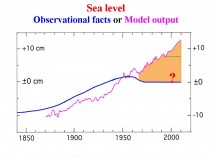The Foundry, Energy and Environment
Another one of the standout presentations at the Heartland Institute’s fourth International Conference on Climate Change was the one by Nils-Axel Morner, former emeritus head of the paleogeophysics and geodynamics department at Stockholm University. His talk focused on sea level increases and the difference between observed data and the Intergovernmental Panel on Climate Change (IPCC) model’s predictions.
Morner was a former reviewer on the IPCC report and when he was first made a reviewer he said he was “astonished to find that not one of their 22 contributing authors on sea levels was a sea level specialist: not one.” Morner discussed the realities of a number of countries and islands claimed to be doomed from climate change. He started with the Maldives, which some reports claim will be submerged in the next fifty years. Morner pointed out that the sea level around the Maldives has been much higher before and actually fell 20 centimeters (7.8 inches) during the 1970s. He also asserted that sea levels have been stable for the past three decades.

The same could be said for Bangladesh, another country threatened by sea level rises. Last year US News reported that “brackish water from the Bay of Bengal is encroaching, surging up Bangladesh’s fresh-water rivers, percolating deep into the soil, fouling ponds and the underground water supply that millions depend on to drink and cultivate their farms.” Morner’s analysis of the data, however, shows that the sea level has been stable for the past 40 to 50 years and may have even decreased. Coastal erosion is unquestionably a problem but it’s not from sea level rise, Morner says. He also reports that there has not been an increase recorded in Tuvalu, Qatar, Vanuatu, Venice and northwest Europe.
Of course, rising sea levels could present problems in the future but so far the hysteria has been unsupported by fact. Furthermore, the policies aimed at reducing sea levels (cap and trade, international carbon dioxide reduction treaties) will have little if any impact. Despite the futility of CO2 cuts, there are many cost-effective, adaptive solutions that efficiently target specific problems and do not require globally adopted treaties. Many of these adaptations are driven by markets. Seed companies develop drought and heat resistant strains that have increased agricultural productivity in the face of global warming. Low tech, but efficient, dams create reservoirs in the Himalayas to provide water supplies and irrigation during dry months. Capping CO2 only hinders the overall economic development of poorer countries and thus puts them in a worse position to adapt to climate change and rising sea levels, if it ever becomes necessary. See more here.
-------------------
Ocean Acidification and Biodiversity - Replacing Climate Change as Environmental Issues
By Bob Ferguson
Could it be that the “case for catastrophic climate change” is proving to be as weak as long suspected? As the UN and the environmental NOGs have failed to convince the public about a climate crisis, the shift appears on to species endangerment, in part derived from “ocean acidification”. Here is my PPT on this issue from the Heartland ICCC IV. See here. As always, the culprit is humanity itself [which needs transnational regulation, reduced living standards and population reduction] and its hydrocarbon-based industrial society [which requires dismantling].
Bob
UN says case for saving species ‘more powerful than climate change’
Goods and services from the natural world should be factored into the global economic system, says UN biodiversity report
• Economic report into biodiversity crisis reveals price of consuming the planet

The Brasilian Nut Tree “Castanheira” is protected in Brasil, but plenty had been logged. Photograph: Daniel Beltra/Greenpeace
The economic case for global action to stop the destruction of the natural world is even more powerful than the argument for tackling climate change, a major report for the United Nations will declare this summer.
The Stern report on climate change, which was prepared for the UK Treasury and published in 2007, famously claimed that the cost of limiting climate change would be around 1%-2% of annual global wealth, but the longer-term economic benefits would be 5-20 times that figure.
The UN’s biodiversity report - dubbed the Stern for Nature - is expected to say that the value of saving “natural goods and services”, such as pollination, medicines, fertile soils, clean air and water, will be even higher - between 10 and 100 times the cost of saving the habitats and species which provide them.
To mark the UN’s International Day for Biological Diversity tomorrow, hundreds of British companies, charities and other organisations have backed an open letter from the Natural History Museum’s director Michael Dixon warning that “the diversity of life, so crucial to our security, health, wealth and wellbeing is being eroded”.
The UN report’s authors go further with their warning on biodiversity, by saying if the goods and services provided by the natural world are not valued and factored into the global economic system, the environment will become more fragile and less resilient to shocks, risking human lives, livelihoods and the global economy.
“We need a sea-change in human thinking and attitudes towards nature: not as something to be vanquished, conquered, but rather something to be cherished and lived within,” said the report’s author, the economist Pavan Sukhdev.
The changes will involve a wholesale revolution in the way humans do business, consume, and think about their lives, Sukhdev, told The Guardian. He referred to the damage currently being inflicted on the natural world as “a landscape of market failures”.
The report will advocate massive changes to the way the global economy is run so that it factors in the value of the natural world. In future, it says, communities should be paid for conserving nature rather than using it; companies given stricter limits on what they can take from the environment and fined or taxed more to limit over-exploitation; subsidies worth more than US$1tn (696.5bn pounds) a year for industries like agriculture, fisheries, energy and transport reformed; and businesses and national governments asked to publish accounts for their use of natural and human capital alongside their financial results.
And the potential economic benefits are huge. Setting up and running a comprehensive network of protected areas would cost $45bn a year globally, according to one estimate, but the benefits of preserving the species richness within these zones would be worth $4-5tn a year.
The report follows a series of recent studies showing that the world is in the grip of a mass extinction event as pollution, climate change, development and hunting destroys habitats of all types, from rainforests and wetlands to coastal mangroves and open heathland. However, only two of the world’s 100 biggest companies believe reducing biodiversity is a strategic threat to their business, according to another report released tomorrow by PricewaterhouseCoopers, which is advising the team compiling the UN report.
“Sometimes people describe Earth’s economy as a spaceship economy because we are basically isolated, we do have limits to how much we can extract, and why and where,” said Sukhdev, who visited the UK WHEN as a guest of science research and education charity, the Earthwatch Institute..
The TEEB report shows that on average one third of Earth’s habitats have been damaged by humans - but the problem ranges from zero percent of ice, rock and polar lands to 85% of seas and oceans and more than 70% of Mediterranean shrubland. It also warns that in spite of growing awareness of the dangers, destruction of nature will “still continue on a large scale”. The International Union for the Conservation of Nature has previously estimated that species are becoming extinct at a rate 1,000 and 10,000 times higher than it would naturally be without humans.


